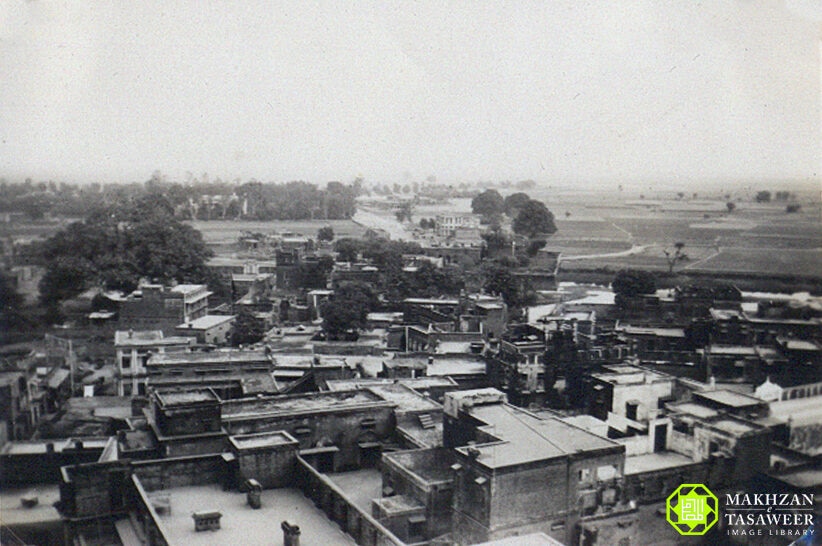Awwab Saad Hayat, Al Hakam
From Tarikh-e-Ahmadiyyat, we learn that 2 January 1900 was the day of Eid-ul-Fitr in Qadian, India. At the behest of the Promised Messiahas, his Companionsra had come from places like Madras, Kashmir, Shahjahanpur, Jammu, Jhang, Multan, Kapurthala, Ludhiana, Shahpur, Sialkot, Gujrat, Lahore, Amritsar, Batala, Gurdaspur etc.
The attendance of the Companionsra exceeded 1,000 and according to some narrations, some revered companions had also come from outside of India.
At 8 am, the Promised Messiahas came to the place where everyone was gathered for Eid-ul-Fitr in a huge field in Qadian that was used for Eid prayers. Hazrat Hakim Maulvi Nuruddinra led the Eid prayer and after the prayer, the Promised Messiahas stood up and delivered an extremely impactful Eid sermon in which he gave a wonderful and deeply insightful commentary of Surah al-Nas.

As India was under the British government at the time and Muslims and all other faiths enjoyed religious freedom, the Promised Messiahas commended this religious freedom the British government had given. At the time, the British were in conflict with South Africa; therefore, the Promised Messiahas, after praising the British for providing religious freedom, asked the audience to pray for their success. In fact, after his address, the Promised Messiahas led prayers with all present for the success of the British in the conflict. Due to this, this sermon is often referred to as “Jalsa Dua”.
This speech of the Promised Messiahas lasted for one hour and was delivered in a manner that everyone could understand it. The language was so simple that according to those who were transcribing the speech, “Even the villagers who spent their lives around cattle, being deeply inspired, exclaimed, ‘His Holiness is saying the truth […]’”
Al Hakam, at the time, reported:
“On the occasion of Eid-ul-Fitr, the Promised Messiahas held a special Jalsa so that prayers could be made for the success of the Transvaal War and to inform Muslims about the rights of the British government and their [Muslims’] responsibilities […]”
During his Eid sermon, while talking about true Oneness of God, the Promised Messiahas said:
“Muslims should be immensely grateful to Allah the Almighty, Who has blessed them with a religion that is free from every kind of corruption, abomination and defect in both theory and practice.”
The speech is full of unique verities and insights and also includes a response to those who raised allegations as to why Hazrat Mirza Ghulam Ahmadas, the Promised Messiah praised the British government?
In response to the allegation, the Promised Messiahas detailed historical accounts and also referred to the Transvaal War. He said:
“Islam establishes the rights of the ruler of the time and those of the benefactor, whereas these mean-spirited people transgress the limits of Allah for their selfish ends. The fact that they readily murder a human being for a piece of bread is strong proof of their meanness, stupidity, and brutality. Our Government is currently at war with a small republic, Transvaal, which is no bigger than the Punjab. It was an act of sheer folly on its part to have engaged in warfare with such a great empire. But now that the fighting has begun, it is incumbent upon every Muslim to pray for the victory of the British.
“As for Transvaal, what concern have we with it? Our duty is to wish well for one who has bestowed countless favours upon us. When a neighbour has so many rights that a heart bleeds upon hearing his suffering, does it not grieve our hearts upon reading the hardships endured by the loyal soldiers of the British Government?” (Proceedings of the Prayer Meeting [Roedaad Jalsa-e-Dua], pp. 27-28)
Throughout the sermon, from different angles and examples, the Promised Messiahas told his followers why it was important to abide by the laws of the land and the British government. He reminded them of the lawlessness and lack of religious freedom before the British and, in this way, showed why he praised the British.
The Al Hakam correspondent reports that after the sermon, the Promised Messiahsa, with great passion and fervour, raised his hands for prayers along with everyone present, who numbered more than a thousand. The prayer lasted for a long time and everyone prayed with great fervour for the success of the British. (Al Hakam, Vol. 4, No. 5, pp. 3-10, 10 January 1900, taken from Malfuzat, Vol. 2, pp. 9-29, Edition I)

